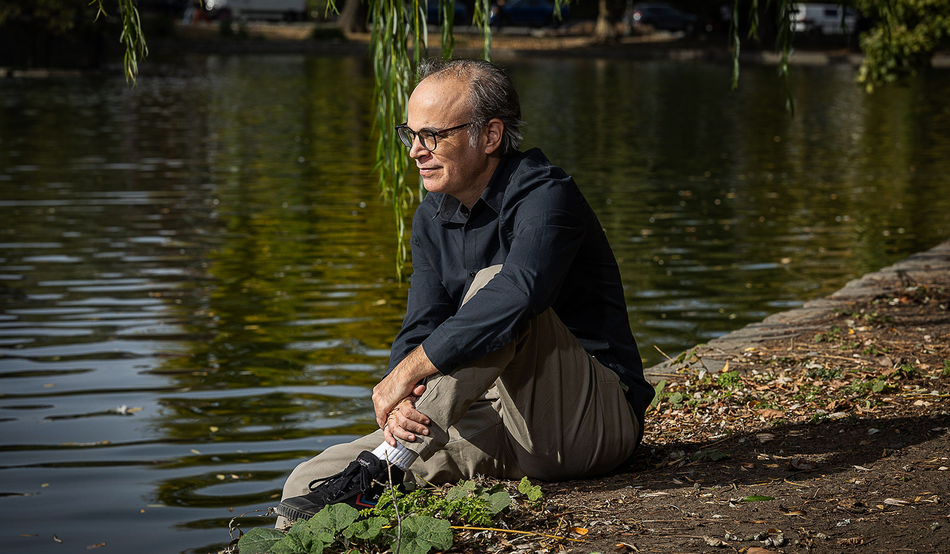Ilan Volkov didn’t expect his viral moment. In September, following a concert at the Proms in London, the Israeli conductor gave a brief address. “In my heart there is great pain now, every day for months,” he read from a piece of paper, his hand shaking. Israel is “my home, but what’s happening now is atrocious and horrific in a scale unimaginable”.
Some spectators jeered, but he faced them with grace: “You will let me finish and then you can curse me all your life.”
Online, Volkov’s message went far beyond his audience in the Royal Albert Hall. “I didn’t think about virality at all,” he tells me over video call from Jerusalem. “I thought I would give a speech in front of 5,000 people and that maybe it would be a bit in the media afterwards.” Six months earlier, he had decided to take this opportunity—“my biggest concert of the season” —to speak out about the horrors of the Gaza war, though he wrote the text only an hour earlier. He likes spontaneity.
When we speak, Volkov is standing on a sunny street in Jerusalem. The previous day, a Jewish activist had been detained while supporting Palestinians in the West Bank, and the 49-year-old conductor, who has himself been arrested while protesting the war, has come out in solidarity. Throughout our call, Volkov, with his black-rimmed glasses, grey hair and beard, is on the move—pausing our interview to check for updates on the detainee or getting into his car to drive to another meeting.
Though a ceasefire had just been announced, Volkov doesn’t predict the dawn of “a new day”, given the humanitarian crisis in Gaza and continued Israeli bombardment of the Strip. But despite having zero trust in Israel's government “acting in citizens’ interests”, he does want to “be optimistic”.
Still out in the sun, he criticises what he calls the “navel-gazing” of Israelis. “As an Israeli, in my opinion, I have only one thing I can talk about, which is what the Israeli government and the army have done in Gaza… This is the only thing that interests me.”
“Liberal cooperation” is part of his diagnosis for why Israeli opposition to the atrocities in Gaza is not more widespread: “As soon as the army does something, we fall silent.” Aside from getting rid of their government, he believes Israelis need to push for a “deep change within Zionism... so there will be hope in this place.”
Volkov first came to London in 1993, aged 17, to study, and became principal conductor of the BBC Scotland Symphony Orchestra aged 27. He thinks of himself as a “British musician”, even though he’s not British. The UK is where “all my important musical life has happened”, he says. The day before we speak the City of Birmingham Symphony Orchestra announced his appointment as its principal guest conductor.
With a storied career abroad and the fact he “barely” worked in Israel in any case, he notes it is easier for him to take a stand than for the average Israeli. After the Proms speech, Volkov told the Times he had stopped working in Israel completely, as an act of protest.
Has he ever been on the receiving end of calls for boycotts? “In classical music, there isn’t really this issue,” he says. But, in May last year, Art Workers for Palestine Scotland published an open letter calling on Tectonics, a music festival he founded in 2011 and which is held annually in Glasgow, to clarify claims against it regarding its cultural or financial links with Israel. He says the claims made in the letter were spurious. “It was very unpleasant. Lots of musicians signed it, including people who know me very well… That was hard”.
In Birmingham, Volkov wants to present works in innovative ways, “not only to think about what the audience knows or likes”. In his daily life he listens to all sorts of music, and relishes change. In the week of our interview, his soundtrack was traditional Congolese music recorded in the 1970s.
The first year after 7th October, he didn’t listen to much music at all. But Volkov did listen to and read a lot about the conflict. “It was maybe the first time I really read [the] history of the conflict from a Palestinian perspective.” People like him, “the Israelis that understand... that we committed an unforgivable genocide”, have a responsibility to say something, he says. “Closing our eyes is not an option”.













